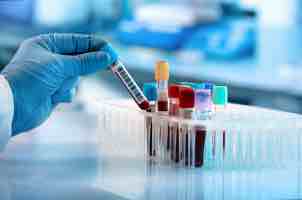
Watch this Article in Video Format
Therefore significant progress in medical analysis, the CBC lab Test Report is revolutionizing blood checkups and opening doors to new treatment approaches. This advanced exam can change the medical system by giving a valuable understanding of the patient’s overall health and aiding in developing targeted treatment plans. It also helps detect the presence of several sexually transmitted diseases for which STD treatments are required. Let’s explore how this blood exam modifies blood analysis and its impact on future medical practices.
The Power of Investigation
This exam is a comprehensive CBC blood test analysis that provides crucial information about the layout and features of the patient’s blood. It measures various components, including red and white blood cell counts, haemoglobin levels, and platelet counts. This detailed analysis also helps medical professionals to assess the patient’s health and identify potential flaws or imbalances. Regular monitoring with this simple check helps to find any possible abnormality on the way. Various blood infections, anaemia, and several infections can be detected by this investigation, along with many other conditions. Moreover, this non-invasive process is highly simple, affordable, and reliable. It helps us make informed health decisions and make us aware of any future problems.
Unleashing New Treatment Approaches
- Precision Medicine: Tailoring Treatment to Individual Patients
With the insights obtained from the CBC Sampling, medical workers can adopt a correct medicinal approach. By understanding every patient’s unique blood composition and specific health markers, treatment plans can be made to address individual needs effectively. This personalized approach allows for more targeted and proper interventions, including better treatment results. Moreover, it also aids in minimizing adverse reactions.
2. Early Disease Detection: Prompt Intervention for Better Prognosis
This plays a crucial role in early disease detection. Medical professionals can detect various conditions early by finding abnormalities in blood components, such as abnormal cell counts or lack of balance. Early detection enables timely intervention, increasing the chances of successful treatment and improving patient progress.
3. Monitoring Treatment Progress: Adjusting Therapies in Real-Time
The result holds high value for monitoring the progress of treatment. By analyzing blood samples regularly, medical workers can estimate how patients respond to treatment. Changes in blood counts or markers can show whether a treatment is effective or if adjustments are needed. This real-time feedback allows for proactive adjustments that help patients receive the most appropriate and optimized care.
Enhancing Healthcare Practices
- Streamlined Workflow: Faster and More Efficient Analysis
The advent of advanced CBC sampling systems has made the workflow smooth in medical labs. Automated systems can now efficiently handle large samples, reducing changing times and increasing the analysis speed. This type of workflow increases lab productivity. Therefore, medical workers can access critical information faster and aid in making prompt decisions.
2. Improved Patient Experience: Minimizing Discomfort and Stress
Complete blood count improves the patient experience by minimizing discomfort and stress. With automated systems, sample collection is more efficient and less invasive, reducing patient anxiety. Additionally, faster analysis and timely results mean patients can receive necessary treatment and interventions promptly, leading to better overall patient satisfaction.
Role in Finding Sexually Transmitted Diseases
While this exam itself does not directly detect sexual diseases, it provides valuable information about the overall health of the patient. It can test possible infections or complications associated with STDs. For instance, an elevated white cell count may show an ongoing illness or inflammation, including sexual diseases like gonorrhoea, chlamydia, or HIV. It measures different blood components, including red cells, white cells, haemoglobin, and platelets. Therefore, this broad analysis also provides insights into a person’s blood count and can detect abnormalities or imbalances.
Requirement of sampling
This exam is crucial for maintaining overall health and well-being. Sexually transmitted diseases can have serious consequences if left without treatment or detection. Regular STD Lab testing is vital for early detection, timely treatment, and preventing the spread of infections. Sexual diseases often show little to no symptoms in their early stages. Therefore, monitoring is crucial as it allows for early findings that lead to timely treatment. Identifying infections early increases the chances of successful treatment and lessens the risk of long-term problems.
This investigation is important for individuals’ health and preventing infection from spreading to sexual partners. Many STDs can be asymptomatic or have mild symptoms. This nature makes it easy for them to spread from person to person unknowingly. Therefore, by regular monitoring, individuals can know their infection status. This will help them to take appropriate measures to protect themselves and their partners. Moreover, they give peace of mind and help promote safer sexual practices.
Conclusion
Monitoring is revolutionizing blood analysis and changing medical practices. By giving a proper understanding of blood composition and health markers, this advanced exam opens doors to new treatment methods. Moreover, as technology continues to advance, the impact of this exam on the medical system is set to grow, leading to better patient results and the potential for new and creative medical discoveries.
While this does not directly detect sexual infections, it plays a crucial role in overall health assessment and can show possible conditions or problems related to STIs. Additionally, high white blood cell counts in a CBC Report may signal the presence of an infection, including sexual diseases. However, it is necessary to consult STD test medical professionals for proper diagnosis. Therefore, regular monitoring and appropriate checking methods are crucial for early finding, timely treatment, and preventing the spread of sexual diseases.

